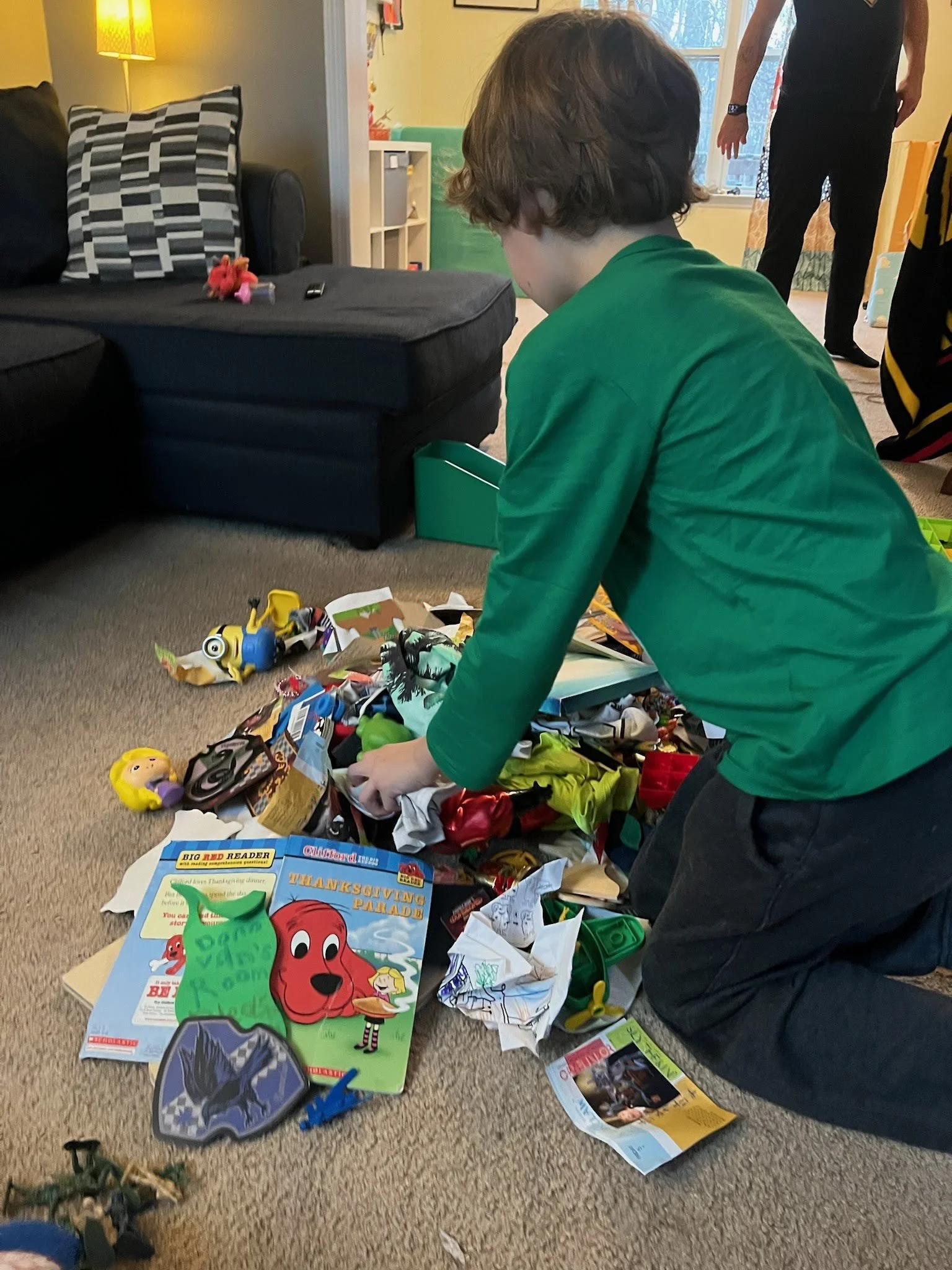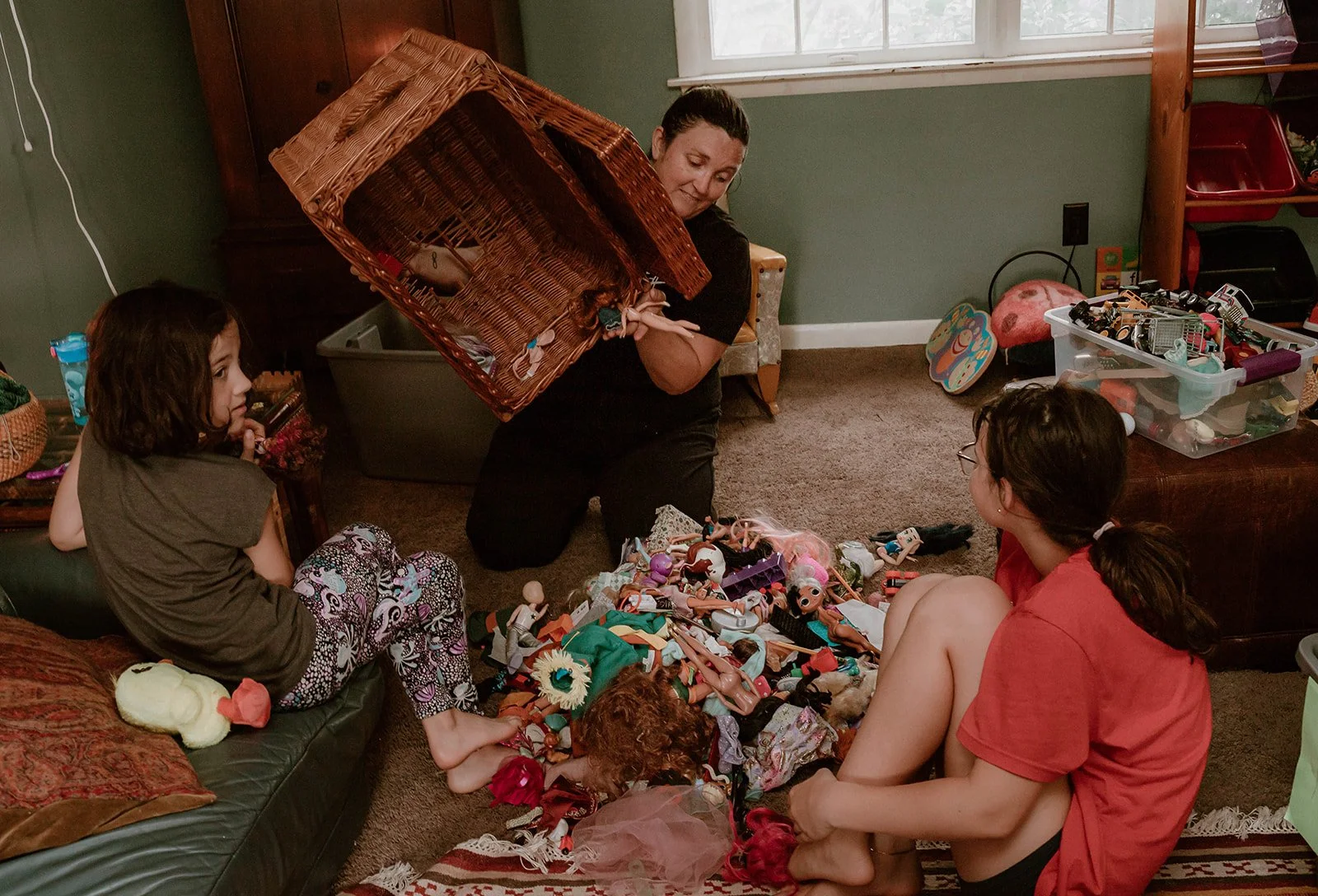Mistakes we make when decluttering with kids
As a decluttering aficionado AND a toddler mom, I sometimes find myself in a power struggle as we work to pare down his belongings.
Does this ever happen to you? You have the best intentions to minimize their spaces to help foster their creativity, improve their focus, and reduce their adverse behaviors, and yet you’re arguing about STUFF?
Even as a professional organizer and an occupational therapist who understands development levels, I’m still human and have to consciously resist natural reactions to the process.
So, please, read and reread this list of 5 things NOT to say to your kids if your true goal is to teach the important life skill of organizing. And tell all your friends. And firm up your boundaries with family members. And work on your own baggage around these issues because realistically you were probably taught the opposite and you can undo the clutter/shame cycle.
(And stay mindful. Because I’ve done all of the above and I still make mistakes! Give yourself grace and repair with your kid[s] intentionally.)
You have way too much stuff
Let’s be real, are your kids filling up their own Amazon carts and clicking Buy Now without your even knowing? They’re not taking themselves to Target and coming home with bags and bags of stuff. Even if your kids are asking for items at a yard sale or Five Below—which kids do, it’s normal (they’re not being rude, selfish, bad for asking)—YOU are the one with the wallet who buys it out of guilt, “caves” to avoid a tantrum, or despite your better judgment allows them to bring home yet another toy.
YOU as the parent are the one who made the decision. It’s an uncomfortable truth to face, and sometimes when we are uncomfortable, we shift blame to offload that discomfort.
Please remember: Kids aren’t emotionally mature enough to set boundaries with grandparents and well-meaning family members who show love with presents. Their brains are not developed yet. Shaming kids for how much they have is totally unfair.
…but you HAD to have that!
Haven’t you ever changed your mind? Kids especially are evolving constantly, their likes and needs changing frequently as they pass through developmental stages. This is healthy and normal.
I can remember being a kid and saying I liked butterflies, and at the next birthday being flooded with all butterfly everything. I didn’t ask for all of that; I just liked butterflies. And then when they were everywhere I looked, I lost interest. Kids don’t need EXCESS. Even if they think they want it all, they don’t. If it’s overwhelming for you as the parent, it’s overwhelming for them.
If you sit back and observe without comment, without judgment, you’ll see that once-favored toys disappear from the play rotation because there’s newer, shinier things, which then fade into oblivion when more and more comes in.
…but that was so expensive
And they’re kids who don’t understand the concept of money. It wasn’t their money to spend, so they didn’t make the informed choice to spend that money (when it wasn’t the wisest choice). It was your money, and that money has already been spent. It’s over, it’s gone.
If you’re hell bent on recouping some of that money—and the item is gently used/still in good shape—consider selling. Or, you can tolerate the discomfort and recognize at the next opportunity when your kid wants an expensive gift that it might not be a permanent staple. It is OK (and also important) to say no.
…but that was a gift from X
Guilty clutter is something so many of my grownup clients suffer from. Don’t put this on our kids. We can protect them from that. We can teach them what it looks like to receive graciously and to let go with gratitude. We can help them learn how to put thought into a gift, that’s what matters. (We can further teach them that our time, energy, and love mean more than material things but I digress.)
The best moment for the gift giver was when your little one unwrapped it and was so excited!
Would you want someone you love to hold onto a gift you gave ONLY because it was from you? Unlikely.
…but are you sure? [or another variation…you won’t feel (sad/regretful/bummed) if you get rid of that?]
Kids are making their own choices, and in a way that feels good for them. Kids are lucky because they don’t get bogged down by overthinking or paralysis. Don’t allow them to doubt themselves or feel anxious about their decisions. Peer pressure, social media, and society will handle that for us.
When we empower them to make choices, we can allow and validate any adverse feelings that come up. It’s a natural consequence and they can handle it. For the most part, kids feel so happy and love their revised spaces. They can handle it—you can too.
One time my therapist said, “If you’re strong enough to make a choice, you’re brave enough to face the aftermath.” Think about this. It might have been unimaginably hard for you to leave a relationship, change jobs, or let go of a family heirloom, but you did it, and you’re OK. Our kids will be too.
OK, ok, I know what you’re thinking. What if YOU don’t want to let go? Here are a few options for YOU if your child wants to donate something you love or you worry they’ll miss too much:
Move the item to your sentimental bin. The language is not questioning their decision but honoring your own attachment: “It’s OK you are ready to let this go. Me? I have a lot of happy memories of you playing with this; I’m going to hold onto it to treasure and reminisce, so I’m going to store it in my sentimental bin.”
Save the item in a “grandparent” bin.
Give it an expiration date. Put the toy(s) in an opaque bin out of sight, like in the basement, and add to your calendar the expiration date. If they haven’t mentioned or ask for it in a month, it’s time to move it out.
My goal as a professional organizer is to empower you to make the best choices aligned with your goals (and in this case, your vision for your family)—and that looks different for each person. More than that, as an occupational therapist and mom, it’s critical to me that we help kids learn these skills in a way that helps build confidence and independence. Let help you help them develop age-appropriate (and developmentally appropriate) skills that can be expanded and built upon as they grow.







